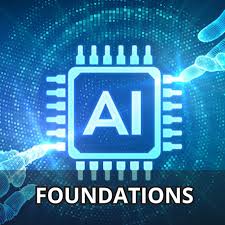1. Philosophy (Logic and Reasoning)
- Roots in ancient philosophy (Aristotle, Descartes, Leibniz).
- Concerned with questions like: What is intelligence? Can machines think?
- Formal logic and reasoning systems form the basis for symbolic AI and knowledge representation.
2. Mathematics
- Logic: Propositional & predicate logic, used in reasoning and inference.
- Probability & Statistics: For dealing with uncertainty and decision-making.
- Linear Algebra & Calculus: Fundamental for machine learning and neural networks.
- Optimization: Central to training AI models.
3. Computer Science
- Algorithms & Data Structures: Core tools for AI computations.
- Theory of Computation: Understanding what can (and cannot) be computed.
- Programming Languages: Early AI used LISP, Prolog; today Python dominates.
- Search & Problem Solving: Algorithms for exploring possibilities (A*, minimax, Monte Carlo tree search).
4. Neuroscience & Cognitive Science
- Human brain as inspiration for neural networks and learning systems.
- Cognitive models of perception, memory, and problem-solving influence AI design.
- Connectionism (parallel distributed processing) shaped deep learning.
5. Psychology
- Study of human learning, perception, and decision-making.
- Behaviorist and cognitive theories inspired machine learning approaches.
- Human-computer interaction and natural language processing draw from psycholinguistics.
6. Linguistics
- Understanding and modeling natural language.
- Semantics, syntax, and pragmatics guide NLP systems.
- Early symbolic approaches (grammars, parsing) evolved into today’s large language models.
7. Engineering & Control Theory
- Robotics and autonomous systems rely on control, feedback, and stability theories.
- Cybernetics introduced ideas of feedback loops and adaptive behavior.
8. Economics & Decision Theory
- Rational decision-making under uncertainty.
- Game theory, utility theory, and reinforcement learning trace back here.
✅ In summary:
The foundations of AI are a mix of logic, mathematics, computation, neuroscience, psychology, linguistics, control theory, and economics. Each contributes perspectives and tools for modeling intelligence.












